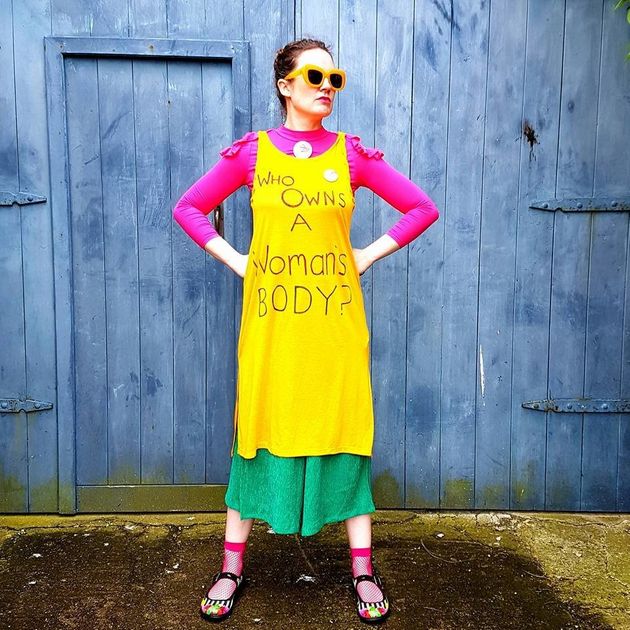The expression “you vote with your money” has never been more relevant than it is today. With increasing awareness of the benefits of shopping sustainably, fast-fashion businesses that benefit from unethical labour are trying to mask their environmental wrongdoings by promoting false activism. Many brands attempt to promote their businesses by falsely claiming to be environmentally conscious.
This particular phenomenon was brought to the forefront in 2014, when the infamous “This is what a feminist looks like” t-shirts, and the three groups, Elle Magazine, Whistles and The Fawcett Society, that collaborated in making them were accused of using sweatshops in the Republic of Mauritius to produce these very t-shirts. The conflicting message of companies profiting from the term feminist while allegedly paying women only 62p an hour was catastrophic. However, this trend has never quite gone away, with thousands of t-shirts and sweatshirts emblazoned with the slogans “feminist” and “don’t call me honey” available in almost every high-street shop.
“The wave of brands selling political statements has prompted a significant rejection of vague platitudes that don’t align with many fast-fashion business practises”
The wave of brands selling political statements has prompted a significant rejection of vague platitudes that don’t align with many fast-fashion business practises. Instead, protestors often sport home-made t-shirts and signs. This gives the public full control not only over the sentiment of what they write, but also over how they source their clothes.
Taryn DeVere, a jewellery designer and fashion activist, is an excellent example of how you can deliberately craft your own pieces to express your beliefs. For Trans Day of Visibility 2019, she made a headpiece shaped like a heart and painted the colours of the trans-pride flag. It read: “I Love My Trans Kid” in vivid gold letters. Given her own experience as both an artist and political activist, she was the perfect candidate for the National Museum of Ireland’s series, OUTing the Past Dublin 2021, where she teaches people how to make their own posters for protests while chatting enthusiastically about her experience attending marches and designing her own political statements. DeVere encourages us to write messages that come from the heart but mentions that “[her] sort of personal philosophy around that is that [she] wants to be sort of careful and mindful of what sort of messages [she’s] putting on [her] body, and putting out in the world”.
She explains how to make the posters as practical as possible, using affordable materials like colourful paper from craft shops, printed letters or using colourful whiteboard markers. She also mentions how she likes to laminate them in case of poor weather and points out that she has yet to attend a protest in Ireland where it has not rained. She likes to string them on some ribbon and wear them around her neck, leaving her hands free. Her advice is nothing but genuine and sincere; it is clear that she feels passionately about both politics and expressing her views through art, advising that when appropriate, she likes to make her posters colourful or humorous. These elements can be seen in her Let Me Be Perfectly Queer poster that she shows her audience in the workshop.
“DeVere is an advocate for up-cycling, which is as much of a political statement as a poster bearing one, as her decision to live and shop sustainably has huge implications for reducing carbon footprint, and renouncing the hold fast-fashion has on the fashion industry.”
DeVere also mentions the particular charm of home-made posters and their imperfections, pointing out that her writing isn’t perfect, nor are her letters completely aligned. However, it certainly gives her posters a much more genuine appearance than the kinds of mass-produced-slogan t-shirts that are available on the high-street. DeVere is an advocate for up-cycling. Her decision to live and shop sustainably has had huge implications for reducing her carbon footprint and renouncing the hold fast-fashion has on the industry.
Towards the end of the workshop, she shows us how to make a necklace from unwanted odds and ends we might have lying around the house. She recommends buying an old necklace from a charity shop to use as a base. When turning a necklace into a piece of activist art, she says, it will be slightly more difficult than a poster or placard as the space is limited. Her advice is to come up with a short slogan first, bearing in mind it has to fit on the necklace and be concise and effective. She recommends using hard or thick types of cardboard so that it has weight and doesn’t flap in the wind if you are wearing it outdoors to a protest. The final piece she shows us is a pink panel that reads “Notorious Bi” and hangs on a rainbow ribbon—as concise, humorous and colourful as a political statement can get.
“The real takeaway from this workshop was how much joy creativity can foster alongside politics and protest.”
As much as DeVere’s advice and tips were brilliant, the real takeaway from this workshop was how much joy creativity can foster alongside politics and protest. She, as well as her posters and necklaces, are charmingly earnest. Her workshop is practical and the materials affordable; she expresses as much passion and personality in her activist art as humanly possible, and most importantly, she exposes the lack of authenticity in fast-fashion slogan t-shirts and the vague political sentiments they often display. At just under half an hour long, I would highly recommend this workshop for anyone looking to start their own journey into making political art and, in turn, making a political statement.






